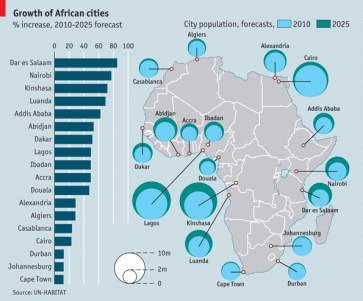…. Kuwait, Gabon, Saudi Arabia, Libya, Algeria, Angola and Nigeria are as urbanized as Uruguay, Taiwan, South Korea, Mexico, Malaysia, South Africa and China respectively, and yet the former countries have not industrialized to the same extent as the latter. This raises several questions. Where do the cities in Angola, Nigeria, and the others come from? Why have so many cities in today’s developing world never been factory cities, in stark contrast to the historical experience of today’s developed countries? If these cities have a different origin, does it matter for economic development?
We show that conditional on income per capita, urbanization rates are unrelated to the share of resource exports in GDP or the share of manufacturing and services in GDP. Urbanization is a function of income per capita across all countries.
However, the composition of urban employment differs starkly between resource-exporters and non-exporters, holding constant income levels and urbanization rates. We use IPUMS census micro-data, labor force surveys, and household survey data to recreate the sectoral composition of urban areas for a sub-sample of 88 countries. Using this novel data set, we find that cities in resource-exporting countries are what we term “consumption cities”, with a larger fraction of workers in non-tradable services such as commerce and transportation or personal and government services.1 Cities in countries that do not export significant resources, on the other hand, appear to be “production cities”, with more workers in industrial sectors such as manufacturing or in tradable services like finance.
That is Douglas Gollin and co-authors in a working paper on urbanization with and without industrialization. The authors also find that ceteris paribus “consumption cities” also tend to be marked by higher rates of poverty and greater shares of populations living in slums. In short, and to paraphrase the authors, consumption cities of resource exporters are not as welfare-improving as production cities of non-exporters.
This should worry policymakers across the Continent. Africa is urbanizing fast (see image), but without the benefits of mass job creation. Indeed UN Habitat’s 2014 State of African Cities report warns that urbanization in Africa lacks the potential “to deliver on the aspirations of broad based human development and prosperity for all.” The continent’s “consumption cities” will have significant impact on state economies. Increased imports of consumer goods (and food) will put pressure on currencies, with inflationary consequences (Africa imports $81b worth of agricultural produce annually). Tending to the urban sector will likely lead to further taxation of the rural sector a la Bates.
That said, demography might provide a way out. Africa’s population is also expected to balloon over the next five decades. That might just create big enough domestic markets to make it worthwhile for firms to consider locating their manufacturing bases on the continent. Increases in labor costs in east Asia are therefore a welcome trend.

Reblogged this on How I see the world.
LikeLike
Hello Ken! Nice article as usual. This point on industrialization has long been a subject of discuss given the ever rapid growth rate of migration from rural to urban cities across the continent. my question/comment is really simple: HOW do we put this in proper context so the government sees it as a key strategic focus so it gets the true attention it deserves?
LikeLike
Reblogged this on Common Sense Economics and commented:
Despite the relatively lack of industrialisation in the some of the aforementioned countries, it is key to note that wage levels and career opportunities tend to be better in urban areas than in rural areas – even for low-skilled people.
The article below gives a good perspective about urbanisation in some developing countries that do not follow the past experiences obtainable in developed economies.
LikeLike